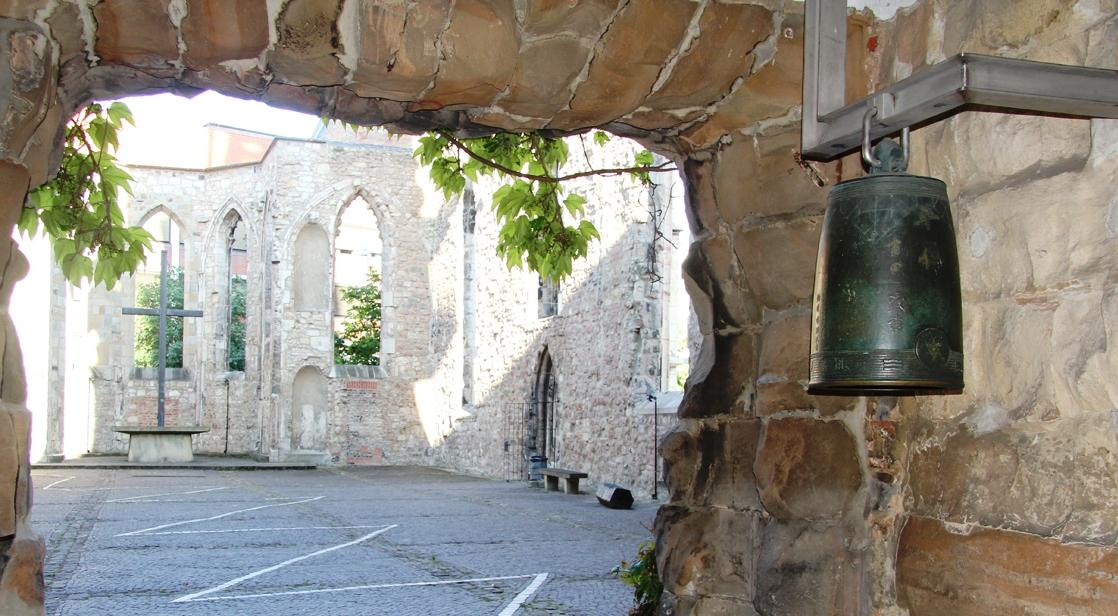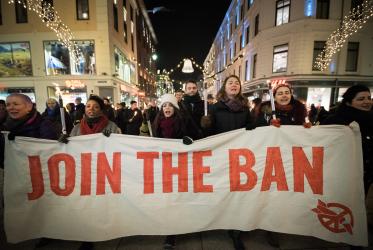Church leaders from seven countries currently making historic choices for or against outlawing nuclear weapons will embark on a pilgrimage in early August to the two Japanese cities that were decimated by atomic bombs 70 years ago.
These church leaders, who represent member churches of the World Council of Churches (WCC) from the United States, Germany, Japan, the Republic of Korea, Norway, the Netherlands and Pakistan, will be in Hiroshima and Nagasaki to commemorate the atomic bombings on 6 and 9 August 1945.
In Japan the delegates will meet with atomic bomb survivors, church members, religious leaders and government officials. They will bring international calls for action home from the two cities. The key step will be to urge their governments to join a new inter-governmental pledge to “close the legal gap” and establish a formal ban on nuclear weapons. This humanitarian initiative already has the support of 113 countries.
Bishop Mary Ann Swenson of the United Methodist Church in the United States, vice-moderator of the WCC Central Committee, will lead the delegation.
“We will be in Hiroshima and Nagasaki to remember the horror of the atomic bomb, and to affirm what ever-larger majorities of the United Nations General Assembly are saying today, ‘It is in the interest of the very survival of humanity that nuclear weapons are never used again, under any circumstances’,” says Swenson.
“This station on the WCC pilgrimage of justice and peace is a very important one,” Swenson said. “As we gather in places devastated by the deadliest of weapons 70 years ago, we are aware that 40 governments still rely on nuclear weapons. Nine states possess nuclear arsenals and 31 other states are willing to have the United States use nuclear weapons on their behalf,” she said.
Nuclear weapons are in the news now because of the talks with Iran and threatening rhetoric in the Ukraine crisis, Swenson noted. “We don’t know where the next threat may erupt, or when a threat may become an actuality of destruction,” she said.
“We invite Christians around the world to join us in prayer as we make this pilgrimage,” she said.
“The 70th anniversary of the atomic bombings is a significant milestone,” said Peter Prove, director of the WCC’s Commission of the Churches on International Affairs (CCIA).
Prove commented, “It is timely because most of the survivors of the 1945 attacks are now in their 80s. Their cries of ‘never again’ must still be heard. It is urgent because the nuclear powers are all modernizing their nuclear weapons instead of abolishing them as promised. It is also hopeful because a growing international majority is forming to ban nuclear weapons, and WCC member churches are involved.”
The seven member churches involved in the pilgrimage are well-placed to take a stand against the world’s most destructive weapons. Their governments – the US, Germany, Japan, South Korea, the Netherlands, Norway and Pakistan – all vow to support nuclear disarmament yet continue to rely on the very weapons that caused such destruction 70 years ago and pose a threat to humanity today. Except for Pakistan, which has its own nuclear arsenal, all of these governments are prepared for the US to use its nuclear weapons against their enemies. Four accept this Cold War-like posture as members of NATO. Two – Japan and the Republic of Korea – do so as US allies in the Pacific.
“This pilgrimage will end by bringing a moral and spiritual critique of the dilemma that began with the attack on Hiroshima 70 years ago to governments that still depend on nuclear weapons today,” said Dr Isabel Apawo Phiri, WCC associate general secretary. “The goal is to help foreign policy officials appreciate the unique opportunity at hand, namely, to align with the majority and promote the common good rather than perpetuate the dangerous, unjust and unstable status quo.”
The mission to Japan and six other nuclear-dependent countries is part of the WCC Pilgrimage of Justice and Peace.
In addition to Bishop Swenson, the delegation members are Rev. Dr Chang Sang, Presbyterian Church in the Republic of Korea, WCC Asia president; Bishop Dr Heinrich Bedford-Strohm, chair of the Council of the Evangelical Church in Germany (EKD); Rev. Baekki Heo of the Korean Christian Church in Japan; and, for part of the programme, Archbishop Nathaniel Uematsu of the Anglican Church in Japan; Bishop Tor Berger Jorgensen, Church of Norway; Rev. Karin van den Broeke, Moderator of the General Synod of the Protestant Church in the Netherlands; Bishop Samuel Azariah, Church of Pakistan; Rev. Dr Stephen Sidorak, United Methodist Church ecumenical officer based in the USA and member of the CCIA; plus International Affairs director Peter Prove and consultant Jonathan Frerichs of the WCC.
Media contact WCC: Marianne Ejdersten: mej[at]wcc-coe.org, +41.79.507.6363
Media contact WCC: Jonathan Frerichs: jcf[at]wcc-coe.org, +81.90.15.12.75.29
WCC Pilgrimage of Justice and Peace
WCC project “Churches engaged for nuclear arms control”








